
KARACHI:
Few people can remember when so many prominent Sindhis – from the politician to the poet – last gathered at one single event. By this measure, Saturday’s convention by the Sindhi Association of North America (Sana) was a grand success, full of hot-blooded debate. But by its very magnitude, the convention also automatically gave rise to the expectation that so much talk will lead to action.
Indeed, there was some harsh self-reflection at work at some of the sessions. “It is the 21st century and we’ve been correcting the system since 1947,” remarked Dr Muhammad Memon, the director of the Institute of Education Development. “We are just talking about schooling, not of an education, and our young generation is not going to forgive us, if we don’t take education seriously.”
The general consensus was that the province is lagging behind in this important sector. Javed Leghari, the chairman of the Higher Education Commission, commented on how education in Sindh is worse compared than in other parts of the country and is in an even more abysmal state in the rural areas. Women are at the bottom rung.
Chaudhry Faisal Mushtaq, the director of Change in Education, pointed out that the teachers didn’t have the proper capacity and the government lacked commitment. “The government is rich enough to pay thousands of teachers but where is the commitment, passion and sincerity?” he asked. “We must encourage public-private partnership.”
Nisar Siddiqui, the director of IBA, Sukkur, dwelt on the lack of teacher training and the fact that not enough research is being done in the province’s universities. Universities were, however, doing a better job compared to the colleges, where cheating and low attendance is rampant.
Economist and provincial government adviser Kaiser Bengali focused on the numbers. “Sindh has 49,600 government schools but I think we just need 15,000 schools – one campus from katchi to intermediate,” he said. “We should build a boarding school in each taluka because students do not pay much attention to their studies while living at home.”
He also pointed out that while it was important to ensure that the state delivers, it is not merely the responsibility of the government to tackle these problems. He was not the only speaker to stress the fact that civil society seems to have taken a backseat on so many fronts.
“All of us, including the nationalist groups, should sit together on one agenda to devise a strategy in order to bring about change,” said Naseer Memon, who heads the Strengthening Participatory Organisation. “A solution lies only in political intervention and we can form a big force by joining hands.”
Many people noted that Sana was able to bring together the many factions of nationalist parties.
They have split into different groupings instead of focusing on the issues at hand. And one of the burning ones is the divide between rural and urban Sindh, highlighted by writer Jami Chandio. While the people in cities worry about terrorists, the people in the countryside live in fear of the feudal, he remarked.
Masood Lohar of the UNDP said that political parties and civil society organisations have to regain lost credibility. “I suggest political parties come up with new ideas and theories, otherwise the people of Sindh will not follow them,” he added.
As far as politics was concerned, talk of the elections was also hot on the floor at Hotel Pearl Continental Hotel. Jalal Mehmood Shah, the convener of Save Sindh Movement, an alliance of all the nationalist parties, said that the situation has now been changed as they have joined hands on the issues of Sindh. “We will now not give a free hand to the ruling party, which has always compromised on Sindh’s issues,” he said.
Sana’s president Valeed Shaikh said that democracy had been restored for now but people say a sham democracy is better than a dictatorship. “Sindh is not going to progress until and unless we find a way forward,” he suggested.
As if to remind people of better times, Justice Fakhruddin G Ebrahim dwelt on the mass migration from India and how the people of Sindh not only welcomed their Muslim brothers, but provided them buildings, lands and even government jobs. He referred to his own example when a Sindhi principal appointed him a lecturer at a college.
The differences that have emerged since Partition were on other people’s minds as well. “I salute people, including GM Syed, who attempted to define who is a Sindhi,” said chief executive officer of Dawn newspaper, Hameed Haroon, for whom there were several challenges in Sindh with the foremost being cultural identity.
“The attitude towards minorities today is not acceptable in Sindhi culture,” he added. “We need to understand and respect village culture because we can’t ignore these people. I am not a good Sindhi, if I am not a good Pakistani.”
US Consul General William Martin, who was the chief guest at one session, took the convention as an opportunity to highlight that certain aspects of life in Sindh were not acceptable. “Bonded labour has no place in the 21st century,” he said. Few would disagree.
Also during the evening, lifetime achievement awards were given to illustrious Sindhis including Comrade Sobho Gianchandani, Amar Jaleel, Abida Parveen, Abdul Karim Lodhi, Noorul Huda Shah, Rasool Bux Palijo and Atta Muhammad Bhambhro.
It is a measure of the excitement of the event that writer and scholar Ibrahim Joyo, who could barely walk, made an effort to come. He had to be helped to the stage where he was conferred an award recognising his contributions to society.
As the award was announced for comrade Sobho Gianchandani most of the people in the hall stood up and applause broke out. “We are awarding the life achievement award to a man whom Tagore had called A man from Moen jo Daro,” one of the organisers said. Though Comrade Sobho, who was educated at Shantiniketan, the university town established by Tagore in West Bengal, was not present, a relative received it on his behalf.
Ayaz Latif Palijo of the Awami Tahreek, Safdar Sarki of Jeay Sindh Mahaz, Hyder Shahani of Jeay Sindh Taraqqi Pasand Party, Abrar Qazi and Khaliq Junejo also spoke.
A slideshow of pictures from the convention can be viewed here.
Published in The Express Tribune, January 15th, 2012.
COMMENTS (8)
Comments are moderated and generally will be posted if they are on-topic and not abusive.
For more information, please see our Comments FAQ















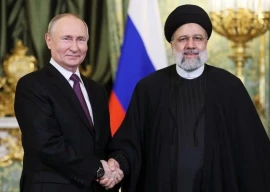
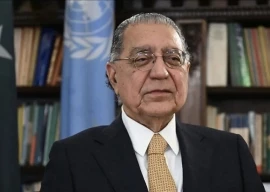
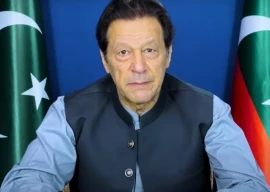
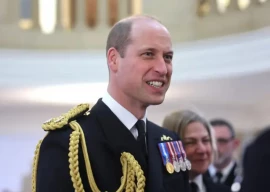
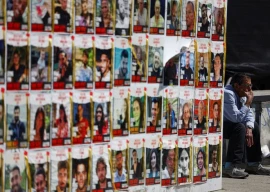
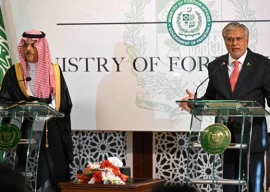















i would suggest that if our national parties just be determined that there would be no political warfare in our educational institutions that will be great service to our sindh dharti
Did they come up with the practical and achievable resolutions? The next year if they meet they must evaluate themselves how much successful there are. We have been listening talks and the talks remain just talks.
@sidrah malik:
unfortunately the punjabis are too ashamed of their mother tongue.we don't speak it with our children,we don't have any punjabi language newspapers,we have a miserably low no. of punjabi tv channels compared to other regional languages,punjabi isn't taught in punjab's schools,the punjabi youth prefers other language over its own mother tongue.We can't blame anyone else but our ownselves for rejecting and abandoning our culture and mother tongue.
Good initiative. I also agree with Kaiser Bengali that civil society organizations should not wait for govt. to get to them. We have to get moving because as someone rightly pointed out, if we don't start solving our problems (specially of education), our coming generations won't forgive us.
@sidrah malik: There is. Apnaorg.com Wonderful site but Punjabi themselves hate their language what I heard with my own ears about Punjabi from my friends I can not write . Watch tareq Fateh interview on u tube. Though I am not punjabi but I look at this site few times Sorry no of fence
why is there no Punjabi association of north america? it's nice to see the sindhi ppl being proud of their language and culture.They set a good example for others in this regard.
Very good initiative by SANA.This is time to reform ourselves and get ready to solve big challenges our people are facing now. We all need to know our enemies who plunder our resources, and conspiring to play with territorial integrity of Sindh. A strong signal is needed to convey to them.